The Independent's journalism is supported by our readers. When you purchase through links on our site, we may earn commission.
Boobs, blackface and pink bombshells: The story behind Twitter-to-film stripper saga Zola
It was the viral Twitter thread that had even Ava Duvernay gripped as it recounted a road trip gone awry. Now it’s headed to the big screen with some help from filmmaker Janicza Bravo. She tells Annabel Nugent about staying true to the story – but dunking it “in glitter”

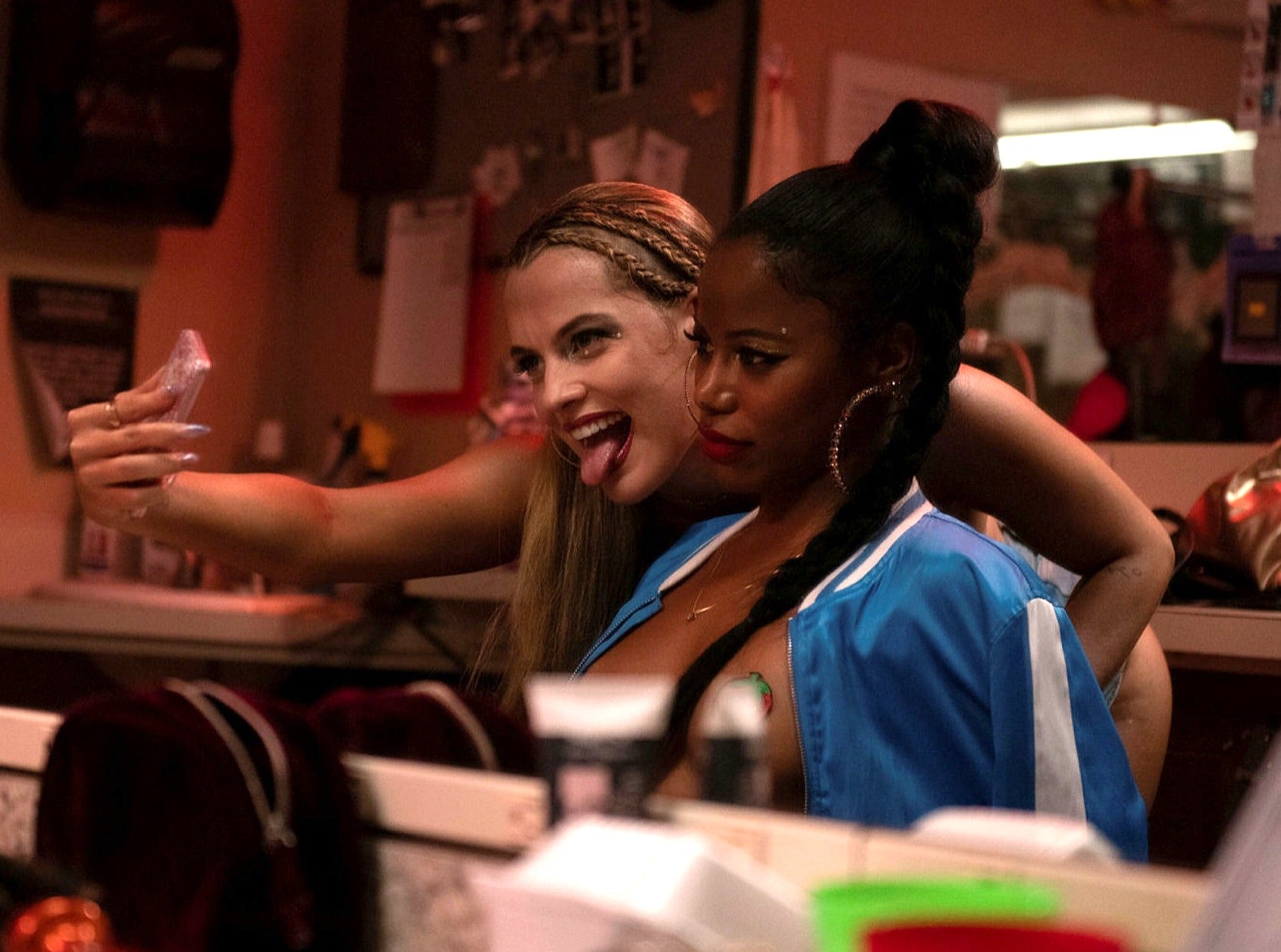
Your support helps us to tell the story
From reproductive rights to climate change to Big Tech, The Independent is on the ground when the story is developing. Whether it's investigating the financials of Elon Musk's pro-Trump PAC or producing our latest documentary, 'The A Word', which shines a light on the American women fighting for reproductive rights, we know how important it is to parse out the facts from the messaging.
At such a critical moment in US history, we need reporters on the ground. Your donation allows us to keep sending journalists to speak to both sides of the story.
The Independent is trusted by Americans across the entire political spectrum. And unlike many other quality news outlets, we choose not to lock Americans out of our reporting and analysis with paywalls. We believe quality journalism should be available to everyone, paid for by those who can afford it.
Your support makes all the difference.Y’all wanna hear a story about why me & this bitch here fell out?” The first line of A’Ziah-Monae King’s Twitter thread will surely go down in history as one of the most memorable openings to any caper, like a millennial answer to “Call me Ishmael” and “Rosebud”. But her follow-up promise – “It’s kinda long but full of suspense” – will follow suit as the understatement of the century. Six years ago, King created what became known as #TheStory, a mind-blowing stripper saga recounted in a whopping 148 posts. The thread went viral, was praised by the likes of Solange Knowles and Missy Elliot, and was so full of dramatic twists and turns that it’s now been made into a feature length film.
You’ll see why: in March 2015, King – who uses the name Zola – was 19 and working at a Hooters in Detroit when she met Jessica, a white woman whose image she shared with that first tweet. The two bonded over internet culture, dancing (they were both strippers) and the simple joy of being young and hot. They vibed, King would later write, over their shared “hoeism”.
The pair exchanged numbers and the very next day, Jessica persuaded King to join a roadtrip with her roommate and boyfriend to Tampa, Florida. King agreed but later realised that she’d made a terrible and potentially fatal mistake. Jessica’s roommate isn’t her roommate; he is her pimp and now he wants both girls to trade sex for money. It also turns out that Jessica was in on it the whole time. As the weekend wears on, King finds herself in increasingly exploitative, dangerous and absurd situations. An abduction and a shooting are only the tip of a terrifying iceberg.
Months later, King shared her story – a tale of Homeric proportions – on the social networking site. It attracted awe not only for the wild ride that it depicted but the self-aware, hilarious voice behind it. Oscar-winning director Ava DuVernay praised King: “Drama, humour, action, suspense, character development. She can write!” Almost immediately, people began casting their dream team for the inevitable film adaptation.
The filmmaker Janicza Bravo read #TheStory the day it dropped on Twitter. “I’m in a group chat with three Black girlfriends and they shared it on our thread,” Bravo recalls. We’re sitting in a sectioned-off area at the Picturehouse cinema in Piccadilly where early screenings of Zola, the adaptation of #TheStory that Bravo directed, are finally being shown to press over a year after it premiered at Sundance. “I had never heard a voice like this – I was turned on by this voice. I wanted to be this voice. I wanted to embody this voice.” It’s a voice that Rolling Stone likened to “Spring Breakers meets Pulp Fiction, as told by Nicki Minaj”. As soon as Bravo read it, she “knew” she had to bring it to the screen.
Bravo forwarded the thread to her agent at four in the morning and began looking into how Twitter IP works. This would be the first Twitter-to-film adaptation ever. In a matter of days though, Rolling Stone published a report revealing that King already had five bidders. Bidders who were much richer and better known than Bravo, who only had some TV writing credits (Dear White People, Atlanta), one film (Lemon, co-created with her then-husband Brett Gelman, which received some awful reviews) and a couple of shorts (including the critically acclaimed Gregory Go Boom starring Michael Cera and Gelman again) to her name. As Bravo pithily puts it today: “They were like, ‘Who the f*** is Janicza?’” But via a circuitous route that seems to confirm her serendipitous worldview, she became the director and co-writer of the most-talked-about moment in internet history – and subsequently one of the year’s most captivating films.
The film stars Taylour Paige as Zola (aka King), Riley Keough as Stefani (aka Jessica) and Colman Domingo as the pimp (christened “Z” in the thread and “X” in the film). Succession’s Nicholas Braun lends his reedy Cousin Greg act to the role of Stefani’s doting boyfriend. It is a sumptuously shot fantasia of crime and comedy, but above all else, it’s a film that strives to honour its original storyteller. King became a close collaborator on the project and is listed as an executive producer. Her name appears in the opening credits. The loosey-goosey standards of “based on a true story” don’t apply here.
Part of staying true to King’s voice is not forgetting where it originated. “Early on, there was a dismissive attitude [in the film industry] about where the story came from, like the fact that it was born on Twitter already made it less than,” explains Bravo. Rather than obscure it though, the film’s frequent dings, vibrations and whistles are unapologetic signage of where Zola unfurls: on a phone. “I felt like A’Ziah’s story mattered,” Bravo continues. “The fact she told it mattered and the way that she told it mattered – and it was really f***ing exciting.”
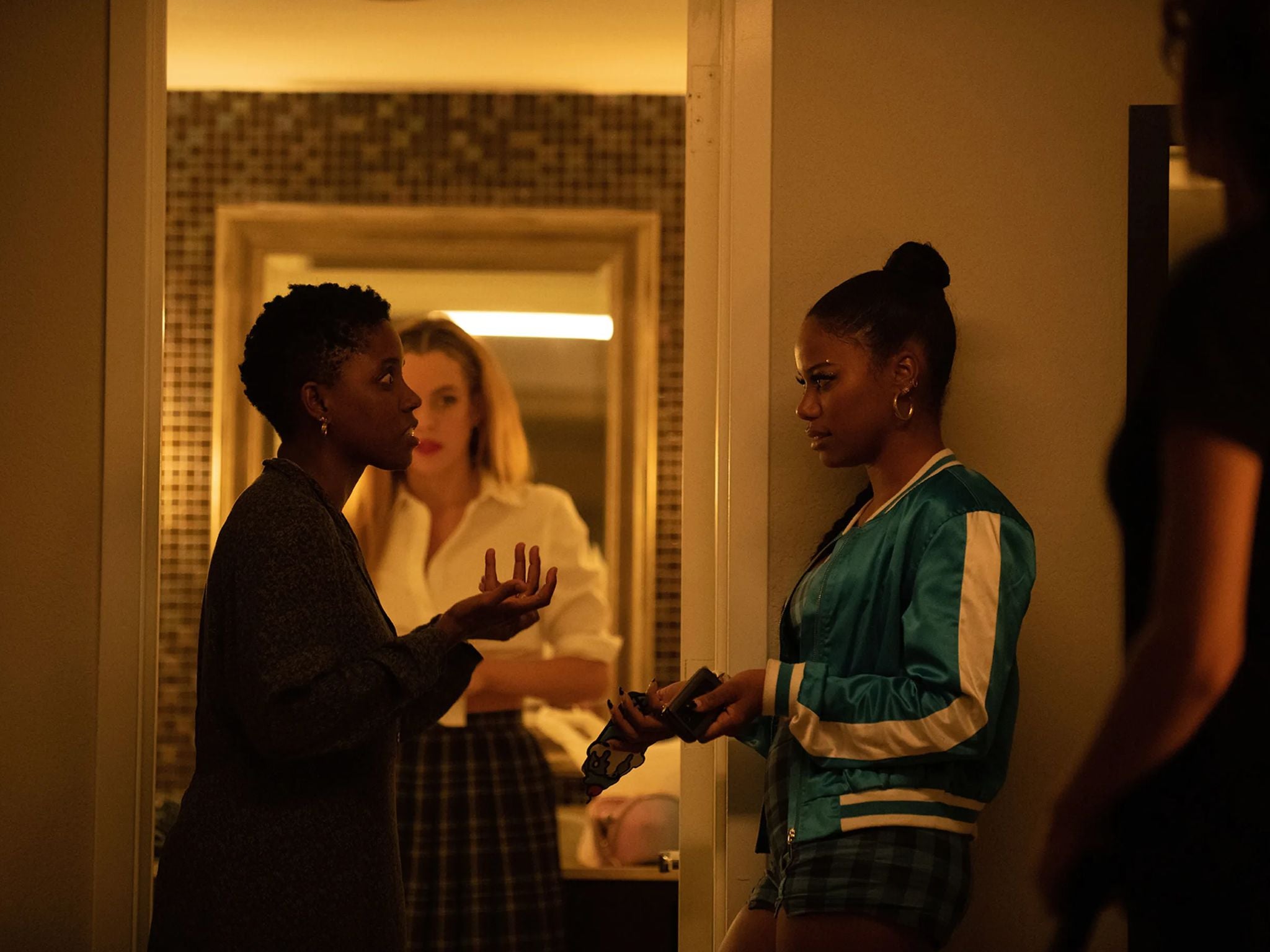
Bravo, who directed as well as co-wrote the script with Tony-nominated writer and close friend Jeremy O Harris, pulled verbatim lines from the original thread. King’s most memorable quotes – like “pussy is worth thousands” – are spoken aloud by the movie’s own Zola. “I wanted to remind the audience of the source material,” says Bravo. “When we’re watching an adaptation of Shakespeare’s work, we know it’s Shakespeare the whole time. And A’ziah is Shakespeare as far as I’m concerned. She’s one of the great writers of our time.”

Watch Apple TV+ free for 7 days
New subscribers only. £8.99/mo. after free trial. Plan auto-renews until cancelled

Watch Apple TV+ free for 7 days
New subscribers only. £8.99/mo. after free trial. Plan auto-renews until cancelled
It is easy to read the thread, which is gut-bustingly funny and enviably self-assured, and forget the terror at its heart. This is a story about a loss of agency. King is a young Black woman manipulated by a young white woman. She is held against her will and forced to endure life-threatening situations. “When I first read the thread, I understood the pleasure that people got out of reading it,” says Bravo. “But it’s also really scary. Behind a lot of this writing is a traumatised person.”
King had gone on the road trip in March 2015. She posted the viral Twitter thread on 27 October that same year. In the months between, King had written two earlier versions of the same story. The first she shared on Tumblr only weeks after the experience. Bravo – who read it as part of the research for Zola – describes that initial iteration as “deeply unfunny” and “really emotional”. “A’Ziah wrote it through tears, and then she deleted it,” she says. Months later, King mapped out a second draft that cleaves slightly closer to the version with which we are familiar. “Then by the time she is writing the third one, which is five or six months after the experience, A’Ziah has a good deal of distance from it,” recalls Bravo. King told The New York Times that by that third revision, she was “ready to be entertained” by her story.
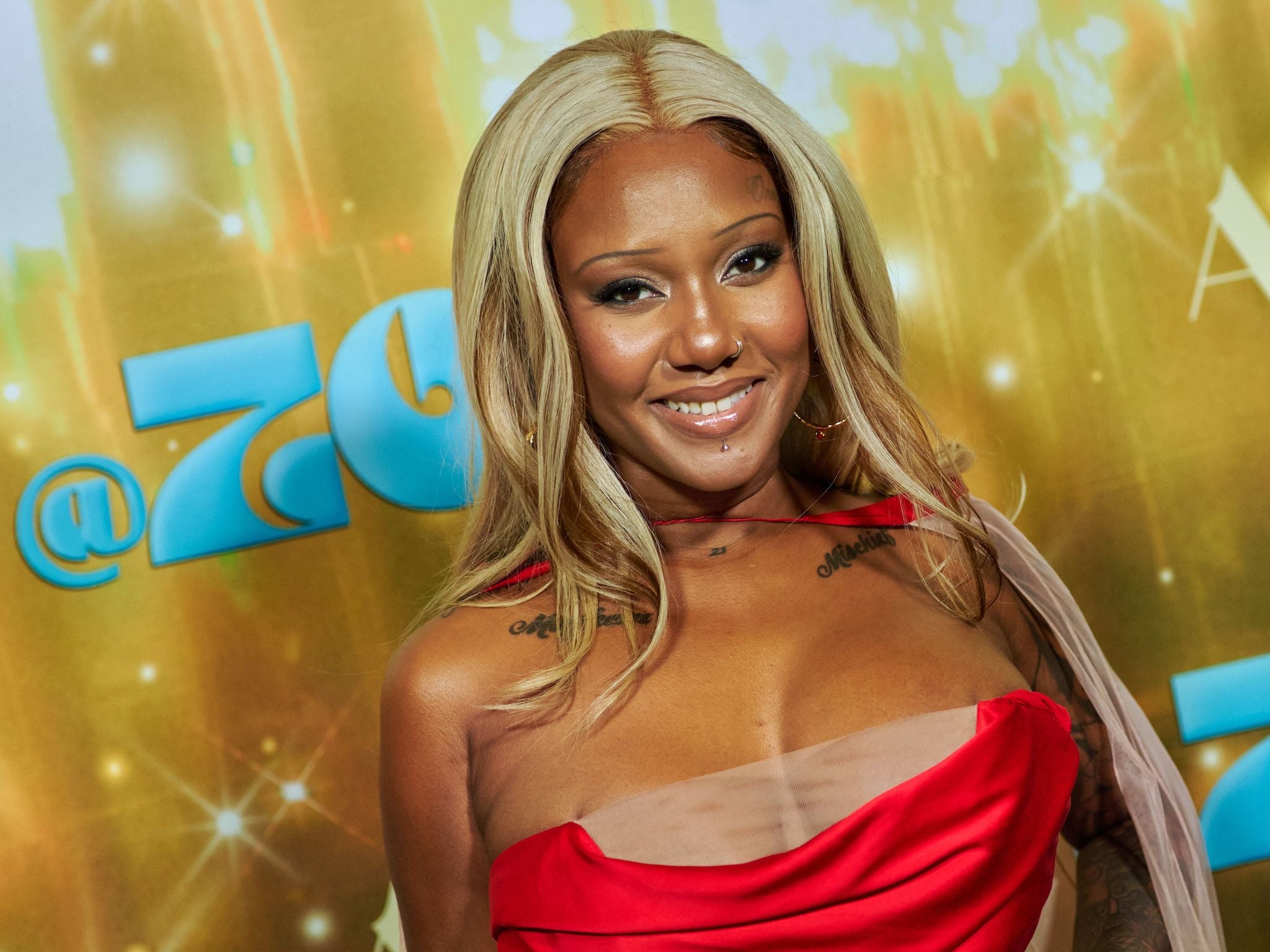
As much as King’s thread – and Bravo’s film by extension – is about trauma experienced, it is also crucially about trauma processed. “When A’Ziah was writing,” the director says, “she was recontextualising the thing that happened to her and she’s also talking to it – trying to explain to herself how she got into this position and trying not to punish herself for the choices she made.
“So when it came to writing the film,” Bravo continues, “I felt the character needed to be in two places at once. The ‘Zola’ that Taylour is portraying is less the girl [in-the-moment] and more the writer who has come out the other side. It’s like the Zola who lived the experience is going backwards and looking at herself inside of the situation.” She laughs. “I know that sounds f***ing nuts.”
Not after watching the film, it doesn’t. As the chaos swirls around Paige’s character at menacing speeds, the camera often falls to the stillness of her face, self-aware and glowering as she absorbs the people around her. We’re reminded that the Zola we’re seeing on-screen is continuously processing and reframing the experience in real-time.
Staying true to King’s story doesn’t always translate to being factual right down to the details. While Bravo pursues a documentary-like portrayal of the harrowing events, Zola has an irresistible surrealist groove. Stylistically, the film relishes in its visuals. Bravo partakes in a Wes Anderson-style penchant for symmetrical framing, while David Lynchian alchemy of the mundane and bizarre can be seen in the film’s ingenious use of Mica Levi’s original score. (When pitching herself for the project, Bravo described her version of Zola as “Blue Velvet meets ‘Bodak Yellow’”).
Bravo took a similarly surrealist approach to Jessica’s character. Stefani (as she’s renamed in the film) is dressed in impossibly expensive clothes: head-to-toe Dior, carrying a Chanel bag in one hand and a Fendi purse in the other. In the film, they drive a Mercedes Benz G-Wagon. The purpose of this elevation, this added boujieness, Bravo tells me, is to portray the world as it would’ve looked to King – who is now in her mid-twenties – as a teenager.
“I think our Zola on-screen is trying to justify why this happened to her,” says Bravo. “And I think part of the way she does that is by portraying the events as if they’ve been dipped in glitz, dunked in glitter. It had to be super glamorous so that we understand why she was duped.”
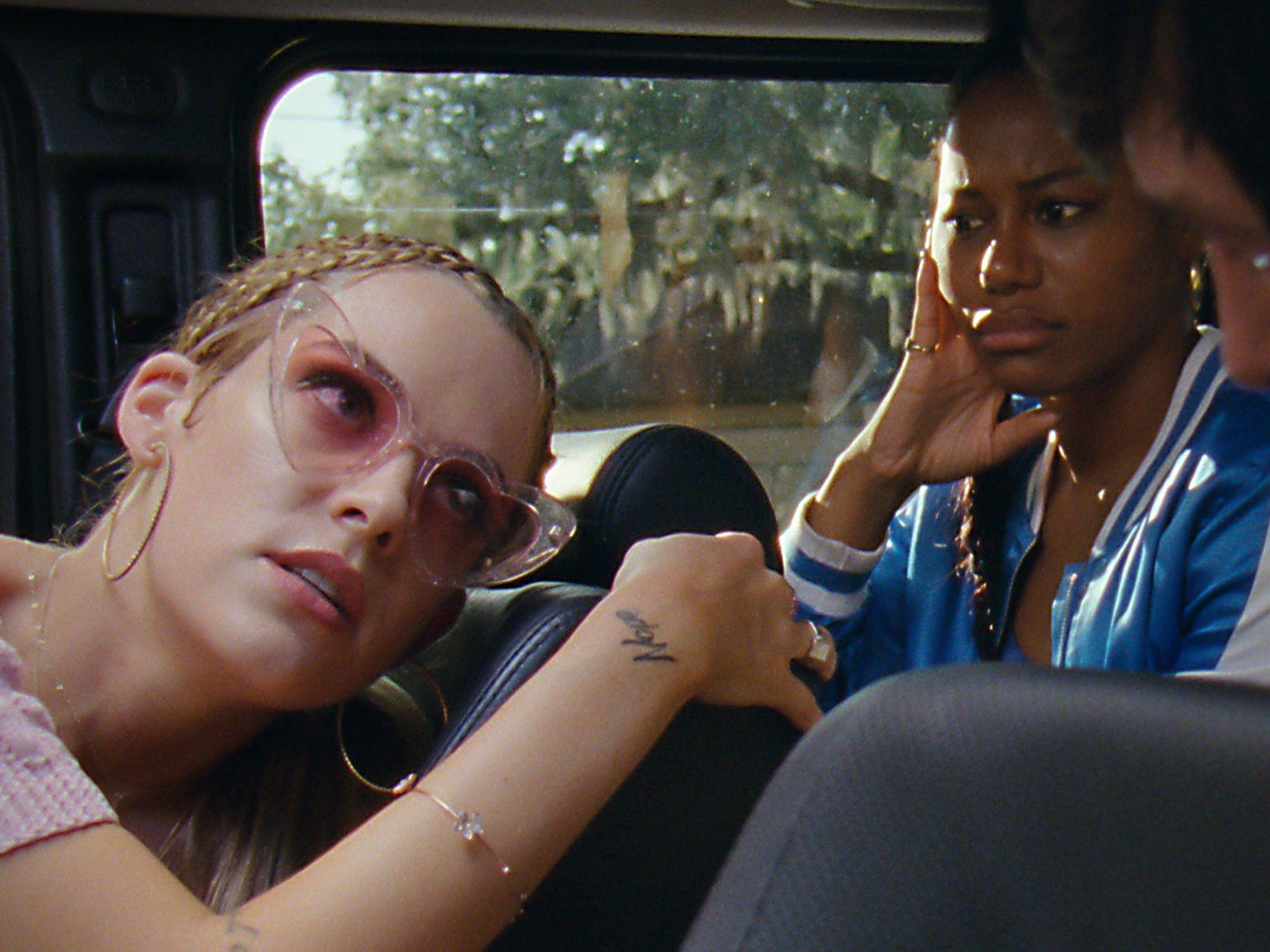
Bravo wanted to reaffirm King’s experience, to embody her point of view throughout. In her mind, there should be no doubt over who is in the right. “If Stefani was normcore, not dialled up to 11 and looking like a pink bombshell, I think the audience would have struggled to believe the truth of King’s story because we as a society especially struggle to believe Black women.” When King’s tweets dropped on Twitter in 2015, it didn’t take long for people and articles to question the validity of her story and for some to assume that Jessica had been hard done-by in its retelling. “I can’t help but think that if A’Ziah was white, would people have been asking if her story was true,” Bravo adds.
Race plays a larger role in Zola than it does in King’s original thread. As Paige said at Sundance last year, Keough’s “in blackface for the whole movie”. Her character Stefani appropriates Black culture to the hilt, styling her blonde baby hairs and parroting the word “sis” back to Zola incessantly. Then there’s the “blaccent”. Some of it was already written in the script, says Bravo, “how the words end with an ‘a’ or the fact they aren’t conjugated all the way. It’s in there a little bit without her being like a ‘wigger’”. But Bravo wanted to go bigger. “I brought it up in our first meeting,” she recalls. “And Riley was like, ‘I’m gonna get cancelled.’” Still, she agreed and worked with voice coach Aris Mendoza to get it right: a mix of Bhad Bhabie and Iggy Azalea. The portrayal got the greenlight from King, who confirmed that it felt true to the real thing. Keough’s bombastic performance, though, also comes back to the issue of believing in and sympathising with Paige’s character and in turn King herself. That blatant appropriation, explains Bravo, is “Riley’s handicap of sorts”. The aim is that she and Taylour are “starting at the same line” in terms of audience trust and preconception, she says.
Following the release of Zola, it feels as though there was no other way for King’s experience to be told. But up until a few years ago, a very different version of #TheStory was underway. In February 2016, James Franco had obtained the rights to produce and direct the film under A24. He brought on two white men – Andrew Neel and Mike Roberts – as writers. The resulting script is described by Bravo as “leading with its dick”. The first few pages included a full nude pole dancing scene. Paige had been approached to audition for the role of Zola in the film’s first iteration, under Franco’s production. She turned it down instantly, having previously said the script felt “really sexist and racist”. She told Dazed that it “wasn’t written with a woman’s voice, and it definitely wasn’t a Black woman’s voice”.
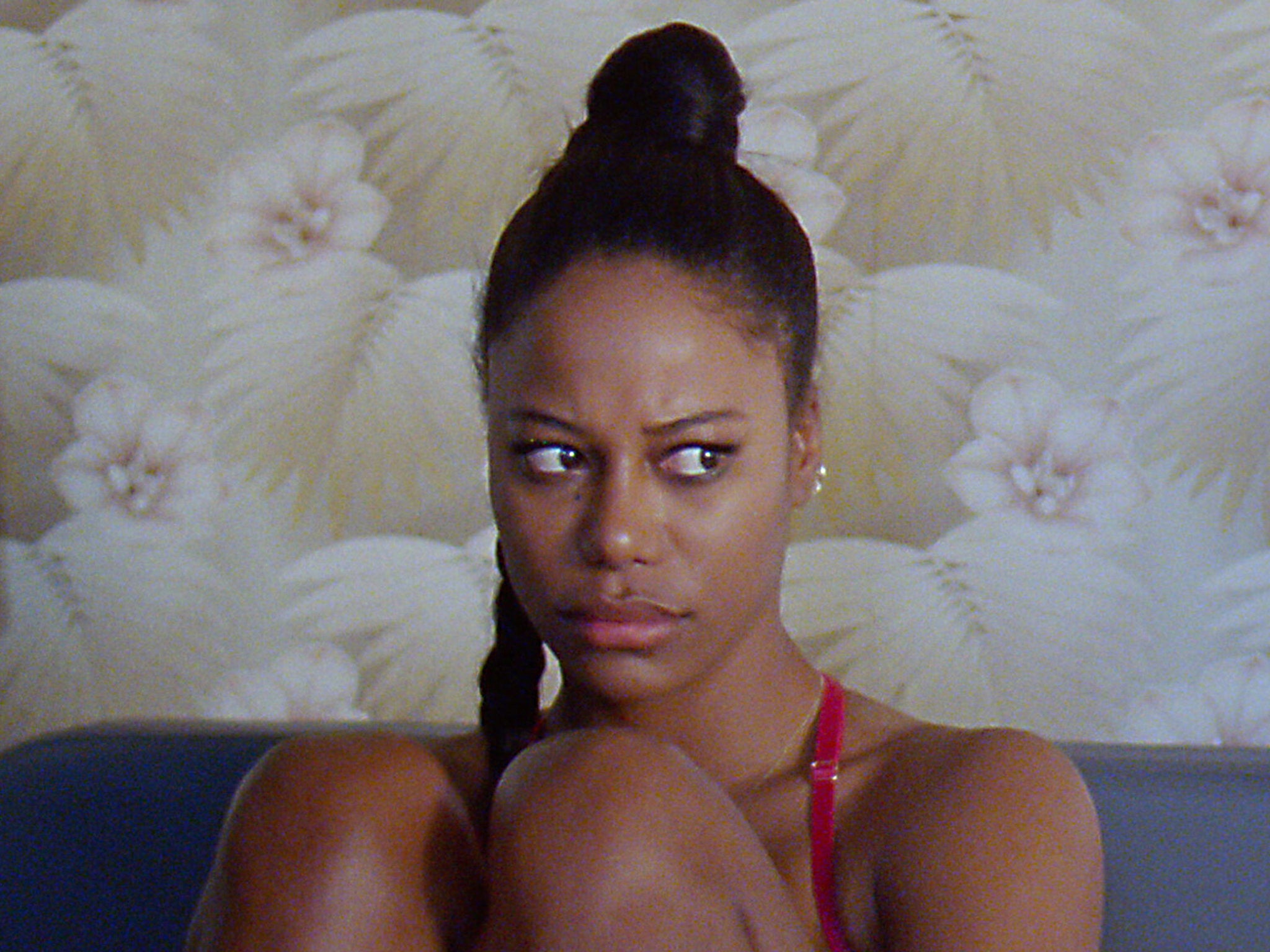
King, who had said yes to Franco, later told NPR that “they added things in the blank space that I guess they thought would be entertaining in a film, and it started to rub me the wrong way”. In 2017, the project stalled due to scheduling conflicts. In 2018, Franco left the film entirely after five women accused him of sexually inappropriate behaviour. Bravo put herself forward and went through a three-month audition process for the directing gig. In May 2017, she landed it and convinced Paige to sign on to the project with a totally new script.
It seems incredulous that three white men – Franco, Neel and Roberts – would have ever been considered the right choice to tell King’s story but as Bravo reminds me, any affront to their initial appointment is newly felt. “It’s funny because people are saying how mad it is now but back then I don’t think that was the case,” she says. “On Black Twitter, a lot of people were saying Harmony Korine should make the film because he did Spring Breakers and then when James got it, people thought that was exciting because it was within that Harmony universe [Korine and Franco worked together on Spring Breakers]. With distance, I think people can look back and go, ‘That was a bad idea’, but back then it didn’t feel like one because James is very famous. People are attracted to fame. I simply could not compete with James Franco. I had done some shorts and one feature film…” They’ll know ‘who the f***’ Bravo is soon enough: Zola has debuted to rapturous reviews and sets the bar high for internet-to-film adaptations.
King caught lightning-in-a-bottle with her story. That bottle being the surprisingly elastic format of Twitter. For Bravo, the question was how to capture lightning-in-a-bottle in another bottle: film. How do you take the immediacy of Twitter and King’s inimitable voice and put it on screen without losing anything? And on a less commercial level, how do you preserve the human at the centre of it all? Bravo answers the former question precisely by asking the latter. Zola is not solely her film. Under her compassionate direction, it remains King’s story too.




Join our commenting forum
Join thought-provoking conversations, follow other Independent readers and see their replies
Comments